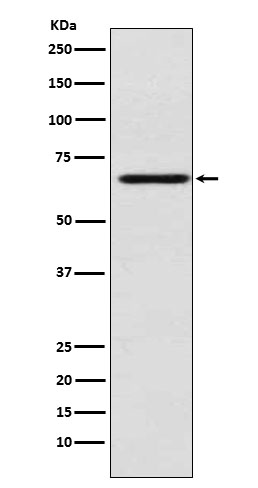
| WB | 1/1000-1/2000 | Human,Mouse,Rat |
| IF | 咨询技术 | Human,Mouse,Rat |
| IHC | 咨询技术 | Human,Mouse,Rat |
| ICC | 技术咨询 | Human,Mouse,Rat |
| FCM | 咨询技术 | Human,Mouse,Rat |
| Elisa | 咨询技术 | Human,Mouse,Rat |
| Aliases | MACAM1; Madcam1;;MADCAM1 |
| WB Predicted band size | Calculated MW: 40 kDa ; Observed MW: 60 kDa |
| Host/Isotype | Rabbit IgG |
| Antibody Type | Primary antibody |
| Storage | Store at 4°C short term. Aliquot and store at -20°C long term. Avoid freeze/thaw cycles. |
| Species Reactivity | Human |
| Immunogen | A synthesized peptide derived from human MADCAM1 |
| Formulation | Purified antibody in PBS with 0.05% sodium azide,0.05% BSA and 50% glycerol. |
+ +
以下是关于MADCAM1抗体的3篇代表性文献,涵盖其功能研究和治疗应用:
---
1. **文献名称**:*Targeting mucosal addressin cell adhesion molecule-1 (MAdCAM-1) in inflammatory bowel disease*
**作者**:Vermeire S, et al.
**摘要**:该研究评估了抗MADCAM1单克隆抗体(如PF-00547659)在溃疡性结肠炎患者中的疗效。结果显示,抗体通过阻断淋巴细胞归巢至肠道黏膜,显著减轻炎症反应,支持MADCAM1作为炎症性肠病的潜在治疗靶点。
---
2. **文献名称**:*MAdCAM-1 mediates lymphocyte-endothelial cell adhesion in a murine model of chronic colitis*
**作者**:Briskin M, et al.
**摘要**:通过小鼠结肠炎模型,研究发现抗MADCAM1抗体可抑制T细胞向肠道炎症部位的迁移,降低肠道病理损伤。该文验证了MADCAM1在慢性肠道炎症中的关键作用及抗体干预的可行性。
---
3. **文献名称**:*Anti-MAdCAM antibody reverses barrier dysfunction and improves experimental colitis*
**作者**:Aranda R, et al.
**摘要**:此文献报道抗MADCAM1抗体不仅减少免疫细胞浸润,还能修复肠道上皮屏障功能。实验表明,抗体治疗通过双重机制(免疫调节+屏障保护)缓解结肠炎症状,为临床应用提供理论依据。
---
以上研究均聚焦于MADCAM1抗体在阻断炎症通路中的机制和疗效,涉及基础研究到临床试验的不同阶段。如需具体文献来源(期刊、年份),可进一步补充数据库检索信息。
MAdCAM-1 (Mucosal Addressin Cell Adhesion Molecule 1) is a cell surface glycoprotein belonging to the immunoglobulin superfamily, primarily expressed on endothelial cells of mucosal tissues, gut-associated lymphoid tissue (GALT), and inflamed sites. It plays a critical role in lymphocyte homing by interacting with integrin α4β7 and L-selectin (CD62L) on leukocytes, facilitating immune cell recruitment to mucosal surfaces. This interaction is pivotal in maintaining gut immunity but also contributes to pathologies like inflammatory bowel disease (IBD), autoimmune disorders, and cancer metastasis.
MAdCAM-1-targeted antibodies are therapeutic agents designed to block this adhesion pathway, thereby reducing inflammatory cell infiltration. Monoclonal antibodies (e.g., vedolizumab, though primarily α4β7-targeted) and experimental anti-MAdCAM-1 agents (e.g., ontamalimab) inhibit leukocyte migration, offering localized immunosuppression with fewer systemic side effects. Research highlights their efficacy in IBD models, particularly ulcerative colitis, by dampening chronic inflammation. Additionally, MAdCAM-1 overexpression in certain cancers links it to tumor microenvironment modulation, suggesting potential oncological applications.
Current studies focus on optimizing antibody specificity, pharmacokinetics, and safety profiles. Challenges include balancing mucosal immune suppression with infection risks and addressing variable patient responses. MAdCAM-1 antibodies represent a promising niche in biologics, bridging mucosal immunology and targeted therapy.
×